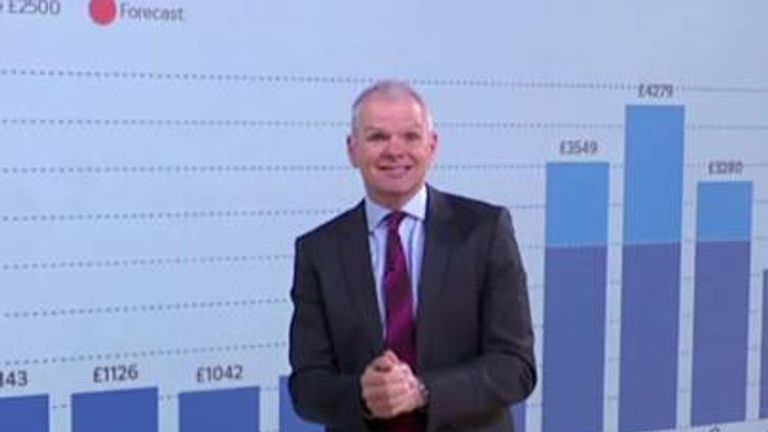Energy bills to fall from today but will still cost almost double pre-crisis levels
Households will pay less for their gas and electricity from today but bills will still be almost double what they were before the energy crisis.
The average household energy bill will fall by £426 a year from 1 July after Ofgem dropped its price cap following tumbling wholesale prices.
People had been advised to submit meter readings before midnight on 30 June to ensure they are paying the lower prices as soon as they come into effect.
Cost of living latest – Huge drop in UK house prices predicted
Those who could not are advised to do so as close to the date as possible, taking a time-stamped photo as proof.
The industry regulator is cutting its price cap from £3,280 to £2,074.
The change is a relief for consumers who have seen typical bills rocket upwards from £1,271 a year in October 2021 due to soaring power prices driven by the post-pandemic recovery and Russia’s invasion of Ukraine.
Households have been partly shielded from the most recent rise in prices by the government’s energy price guarantee (EPG), which limited annual energy costs to £2,500 for the average household.
Ofgem’s latest cut means its cap will again govern household bills, with the guarantee no longer applying.
The change in the cap will result in a typical reduction of £426 from £2,500 to £2,074 – a fall of about 17%.
The energy price cap sets a limit on the maximum amount suppliers can charge for each unit of gas and electricity.
The headline price cap figure is an average across households rather than an absolute cap on bills, so those that use more will pay more.
Read more:
Energy giant hikes capacity at UK’s largest gas storage facility
Record amount withdrawn from savings
Which? Energy editor Emily Seymour said: “While the new price cap will see typical bills drop by around £500, energy bills will still be almost double the amount they were before the energy crisis began – which will be unaffordable for some households.
“If you are concerned about struggling to pay higher bills, there is help available. Speak to your energy provider about a payment plan you can afford and check to see if you qualify for any government schemes.”
Ms Seymour added: “Fixed deals are starting to return to the market for existing customers of some suppliers. We wouldn’t recommend fixing anything higher than the unit rates in your current deal or for longer than a year.
“If you are offered a deal, then it’s really important to check the tariff’s exit fees in case you want to leave that deal early if the price cap comes down.”
A spokeswoman for Energy UK, which represents suppliers, said: “The fall in the price cap from July will be welcome news for customers who have had to face record energy bills over the last year amidst a steep rise in the cost of living and for whom the government’s bill support has been crucial in preventing even bigger difficulties.
“However, bills remain much higher than they were 18 months ago and many customers will continue to struggle, especially following the removal of some of that support.
“If – as the current projections indicate – annual bills of £2,000 plus become the new normal, it underlines the importance and urgency of the energy industry, Ofgem, government and consumer groups working together to put in place targeted support for those most in need next winter.”
Listen and subscribe to the Ian King Business Podcast here
Household energy bills are expected to fall again, to below £2,000 a year from October, according to the latest forecasts.
Energy industry consultancy Cornwall Insight said it thinks the price cap on energy bills will fall to £1,978.33 from October from July’s £2,074, but rise again from January to £2,004.40, based on Ofgem’s current measures.
However, the regulator is adjusting its definition of the average household’s consumption from October, down from the current 2,900 kWh a year for electricity to 2,700 kWh, and from 12,000 kWh for gas to 11,500 kWh, to reflect consumers using less energy to cut costs in the face of high prices.
Based on Ofgem’s adjusted definitions of average usage, Cornwall Insight has forecast that the regulator will announce price caps of £1,871 a year from October and £1,900 from January.
For all the latest business News Click Here


